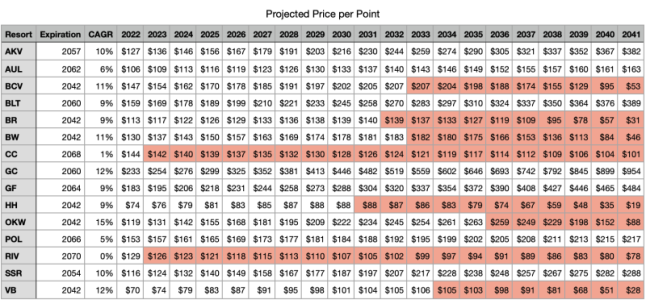Obviously, a lot of people go to the re-sale market under the promise of savings. The more lengthy purchase process, the loss of blue card benefits, and what restrictions are in place, are seen as small costs when you can save 25-40%....
But what are the savings actually?
I'm going to explore 3 resorts -- Riviera, Polynesian and Beach Club. I'm going to assume 20 years of DVC ownership. I'm using 2022 dollars, which means that I'll use the 2022 MFs. (yes, they go up overtime, but the value of the dollar changes accordingly, sticking to 2022 dollars means using 2022 MFs). I'm also going to assume that Beach Club is worthless in 20 years, as the contract expires. I'll assume that Poly and RIV re-sale value will be similar to what it is today -- as they will both have over 20 years left.
200 points of each:
Direct pricing:
Beach Club: $265 per point, with closing costs -- $54,000
Riviera with current incentives -- $191 per point, with closing costs, $39,000
Poly -- $250 per point , with closing costs $51,000
Resale pricing:
Beach Club at $170 per point - $35000 with closing costs
Riviera at $145 per point - $30,000 with closing costs
Poly at $170 per point - $35,000 with closing costs
But now, let's add 20 years of MFs --
Beach Club - Direct - $84,000. Beach Club re-sale: $65,000
Riviera direct: $72,500 - Riviera re-sale: $63,500
Poly direct: $80,500 -- Poly re-sale -- $64,500
Ahhh, but now let's look at total cost after 20 years, where we re-sell Poly or Riv:
Beach Club -- Total cost, direct -- $84,000. Beach Club, total cost re-sale: $65,000 -- 22% savings.
Riviera -- Total cost direct -- $43,500. Riviera total cost re-sale -- $34,500 -- 21% savings
Poly - total cost direct: $46,500. Poly total cost re-sale: $30,500 - 34% savings.
So, savings vary largely. The biggest savings are at the sold-out resorts that you can still later re-sell.
But we see another interesting tidbit....
The total cost of buying Riviera direct is actually 35% cheaper than buying Beach Club re-sale.
The total cost of buying Poly re-sale is 53% cheaper than Beach Club re-sale!
So lessons:
Within a given resort, re-sale may save 20-30% over the long term...
But...
Buying a incentivized resort direct is significantly cheaper than buying a 2042 resort re-sale..
And buying a long-contract on the re-sale market is what actually gives you the lowest possible price, best savings.
While not calculated -- If you hold a long contract for it's full 35-50 years, then the re-sale savings would be much smaller.



